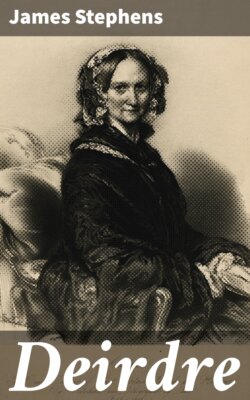Читать книгу Deirdre - James Stephens - Страница 4
На сайте Литреса книга снята с продажи.
CHAPTER I
ОглавлениеTable of Contents
Once on a time Conachúr mac Nessa[1] was on a journey, and had to pass the night at the house of Felimid mac Dall, his storyteller. He was annoyed because his wife, Maeve, had not come with him, but Maeve had the knack of annoying him more than any one else was able to; so that when he thought of her his mind went intriguing and adventuring, for he was always trying to get the better of her, and was seldom without the feeling that she was getting or had just got the best of him.
For this reason he was irritable and could not look at any one with benevolence except Fergus mac Roy. But he could not look otherwise than benevolently on Fergus.
Meantime, night was at hand, and one must sleep, and it is vexatious to sleep alone.
He clapped his hands, and said to the attendant who appeared:
“Is Felimid mac Dall married?”
“He is, master.”
“Give my compliments to Felimid,” said Conachúr, “and tell him that his wife is to sleep with me to-night.”
The attendant vanished and the king was left alone. That is, he was left to his thoughts, for when he was among those he was where other men might not care to follow him. In fact, the large room wherein he sat was almost uncomfortably filled with men: but they kept respectfully apart, playing chess, and speaking in low voices to one another.
The attendant returned.
“A Rí Uasal!” said he humbly.
“Well?” said Conachúr.
“The master of the house regrets that his wife cannot sleep with you to-night.”
“Here is something new,” said the king sternly.
“His wife is at this moment in childbed,” murmured the discreet servant.
“These women are always troublesome,” said the king with jovial anger. “She troubles me by withdrawing herself from my comfort, and she troubles my poor Felimid by giving him a child he could well do without.”
He looked moodily on his gentlemen. There was Cathfa,[2] the famous poet, and Conall his grandson, to be known later as Cearnach (the victorious), but already notable; bitter-tongued Bricriu, who was famous or infamous according to one’s judgement; Uisneac, who had married one of Cathfa’s three daughters, and for whose little son Naoise the queens of Ireland would weep so long as Ireland had a memory; and there was Fergus mac Roy.
Conachúr’s eye travelled loweringly from one to the other of these men until it rested on Fergus, and on him it rested lovingly, benevolently.
He looked loweringly on the others because they did not stand in any particular relation to him at the moment. He looked lovingly and mildly on Fergus because he hated Fergus and had wronged him so bitterly that he must wrong him yet more in justification. His wife and Fergus mac Roy were often in his thoughts, so he looked very lovingly on them and speculated a great deal about their future.
But this night the young king was seriously out of humour, not only because of his wife’s absence, but because of many things that had happened. Three comets in succession had flashed across the sky as they drove to the Story-teller’s house. His leading chariot-horse had trod in a rabbit-hole and its leg was cracked at the fetlock; and one of his attendants had been taken with mortal vomitings, and it did not seem that he would finish until he had emptied his body of his soul.
Conachúr called to his father:
“You are a poet, and should be able to tell us the meaning of these various omens.”
“It is not hard to tell,” said the calm magician.
“Then tell it,” quoth the king testily.
As he spoke a thin wail came from somewhere in the building, and the men present turned an ear to that little sound, and then a questioning or humorous eye on each other.
“You hear,” said the poet. “A child has just been born in this house. She will bring evil to Ireland, and she will work destruction in Ulster as a ferret works destruction in a rabbit’s burrow.”
Cathfa then returned to his chess, leaving the company staring.
“You have the gift of comfortable prophecy,” said the king.
“Put an end to the prophecy by putting an end to the child,” Bricriu advised, “and then let us see how the gods manage their affairs.”
“Bricriu, my soul,” said the king, “you like troubling the waters, but to-night you seem to be afflicted with sense. Bring the creature to me.”
They carried the little morsel to him and she was laid across his knees.
“So you are to destroy my kingdom and bring evil to mighty Ireland?”
The babe reached with a tiny claw and gripped one finger of the king.
“See,” he laughed, “she places herself under my protection,” and he moved his finger to and fro, but the child held fast to it.
“Ulster is under your protection,” growled Bricriu.
The king, who did not like other men’s advice, looked at him.
“It is not soldierly, nor the act of a prince to evade fate,” said he who was to be known afterwards as the wide-eyed, majestic monarch. “Therefore, all that can happen will happen, and we shall bear all that is to be borne.”
Then he gave the child back to its trembling nurse.
Cathfa looked up from the chess-board.
“She is to be called the ‘Troubler,’” said he.
And from that day “Deirdre” was her name.
[1] Conachúr = pron. Kun-a-hoor; mac = pron. mock.
[2] Cathfa = pron. Kaffa.
